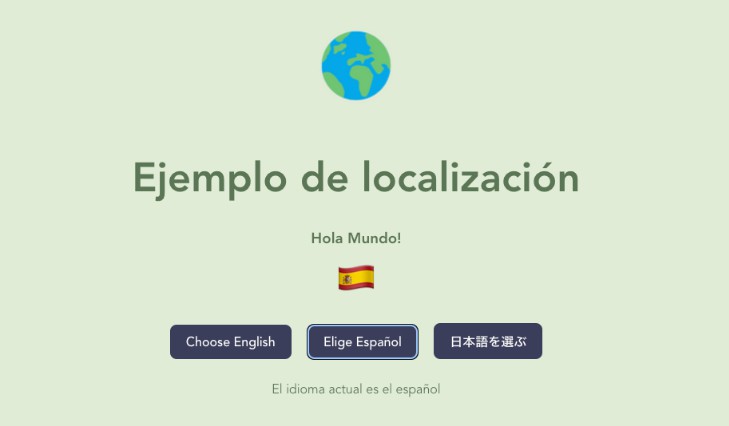i18n-babel
i18n-babel is the most powerful translations manager for javascript applications on the web.
- Easy to integrate: min to no effort
- Web component: works with any framework (React, Angular, Stencil, … even with plain Javascript)
- No external dependencies
- Automatic language detection
- The key is the fallback: if no translations present, the application will show the texts as defined
- Local translations with intelligent update system
- Versioning of translations with local cache in localstorage
- Supports interpolation
- Privacy friendly: local values can be opted-in/out
- Small footprint: < 400 kB (3.4 kB minified and gzipped)
- Free to use
Gold sponsors
From the creators of i18n-babel: translations as a service – blablatec.com
Move your application to the next level: the premium translations service. With blablatec.com you can focus on what you do best: add value to your application, surrounding with valuable partners.
Blablatec.com helps you to manage the translations with an easy and intuitive system.
Local values and Cookie Policies
This library uses cookie lang which must be opted in setting isLocalValuesAllowed: true on initialization.
It also uses localstorage to keep the last version of the translation of each language in local storage. It must be opted in in the same way as cookie.
Configuration
Place the translations in assets/translations/all.json.
For every language, create an all-${langCode}.json where langCode is the 2 letters code for the language. Also create the default all.json:
all.jsonall-en.jsonall-ca.json- …
Every file is in the form:
type TypeTData = {
[key: string]: string;
};
An example file could be:
{
"some text that should be translated": "this is the translation",
"[MAIN.TITLE]": "An important title",
"translation (% interpolated %)": "(% interpolated %) translation",
"translation interpolated object (% interp.someKey %)": "(% interp.someKey %) interpolated"
}
Quick examples
Example of use with plain Javascript
index.html
<!doctype html>
<html>
<head>
<script type="module" src="https://unpkg.com/i18n-babel/dist/i18n-babel/i18n-babel.esm.js"></script>
<script nomodule src="https://unpkg.com/i18n-babel/dist/i18n-babel/i18n-babel.js"></script>
</head>
<body>
<h1><i18n-t>The title of the page</i18n-t></h1>
<p><i18n-t t-data='{"name": "i18n Babel!", "url": "https://i18n-babel.com"}'>Visit us: <a href="(%url)">(%name)</a></i18n-t></p>
<script>
Translator.init({ isLocalValuesAllowed: true });
</script>
</body>
</html>
Example of use with stencil.js app
Install
npm install i18n-babel
Usage
app.ts config file:
import { Translator } from 'i18n-babel/dist/collection/utils/translator';
import './app.deps';
const envConfig: IEnvironmentConfig = {
env: 'production',
};
export default () => {
Translator.init({ isLocalValuesAllowed: true });
};
app.deps.ts:
import 'i18n-babel';
your-awesome-component.ts:
import { Component, h, State, Prop } from '@stencil/core';
@Component({
tag: 'app-home',
styleUrl: 'app-home.css',
})
export class AppHome {
render() {
const tData = {
url: 'https://i18n-babel.com',
name: 'i18n Babel!',
};
return <p><i18n-t t-data={JSON.stringify(tData)}>Visit us: <a href="(%url)">(%name)</a></i18n-t></p>;
}
}
API
Translator
Translator is the main object. It is a singleton class and thus it cannot be instantiated. Use Translator.init(options) to initialize translations. It also supports getInstance() to get an instance to the object at any time of lifecycle.
All public methods of Translator can be used as static or instance method.
init(options: II18nOptions)
Initializes the translator object. Must be called before using i18n-babel. When called after a previous call, it will overwrite the singleton object with the new options.
options: initialization options- returns: an instance to the
Translatorobject
const translator = Translator.init({
availableLangs: ['en', 'ca'],
defaultLanguage: 'en',
userLanguage: 'ca',
isShowMissing: true,
isLocalValuesAllowed: true,
apiUrl: `https://i18n-babel.com/api/v1/application/5f7...`,
appId: 'an-app-id',
appSecret: 't8GTsNsd...',
missingTag: 'app',
tags: [],
});
It accepts an II18nOptions options object with the following parameters:
interface II18nOptions {
/** Allowed languages array, if found language is not in this array, will fall back to default, defaults to ['en'] */
availableLangs: string[];
/** The default language to select when the selected one is not found in availableLangs, defaults to 'en' */
defaultLanguage?: string;
/** Will take precedence over navigator language, defaults to 'en' */
userLanguage?: string;
/** Show missing translations in console.warn, defaults to false */
isShowMissing?: boolean;
/** Allow the use of cookie `lang` to save the language and localstorage to save translations and versions, defaults to false */
isLocalValuesAllowed?: boolean;
/** Api url to get remote updates, defailts to null */
apiUrl?: string;
/** App id to get remote updates, defailts to null */
appId?: string;
/** App secret to get remote updates, defailts to null */
appSecret?: string;
/** The tag that will be sent to server when missing string is found, defaults to 'app' */
missingTag?: string;
/** The tags to filter strings on server side, defaults [] */
tags?: string[];
}
getInstance(): Translator
Translator is a static object.
- returns: an instance to the
Translatorobject
const translator = Translator.getInstance();
setLocalValuesAllowed(isLocalValuesAllowed = false): void
Opts in/out the use of local values.
isLocalValuesAllowedboolean value indicating if local values are allowed or not
WARNING: calling this function with false will remove all local values.
Translator.setLocalValuesAllowed(true);
t(originalText, tData, lang): Promise
Translates a text, returns the text itself if no translation is found.
originalText: text to translatetData: Interpolation parameterslang: Translation language- returns: Translated text
const translation = await Translator.t('Hello from (% name %)!', { name: 'i18n-babel' }, 'ca');
Given an all-ca.json like the following one:
{
"Hello from (% name %)!": "(% name %) et saluda!"
}
The variable translation will become: i18n-babel et saluda!
changeLanguage(lang): void
Changes the language of the application.
Translator.changeLanguage('es');
cacheClear(): void
Clears the translations cache and tries to download again the translations.
Translator.cacheClear();
Backend API
The backend API must implement the following routes:
- GET
${apiUrl}/lang: return an array with available languages - GET
${apiUrl}/lang/loc-version?lang=${lang}: return a float number with the version of the requested language - GET
${apiUrl}/locale/all.json?lang=${lang}&tags=app,server: return a json with the translations for the language- lang: the language in format
'en' - tags: optional coma separated tags
- lang: the language in format
- POST
${apiUrl}/locale/missing: saves missing string, body contains the data for the missing string:- lang: the language of the translation,
- tag: the tag for this translation, in order to filter translations ing GET
all.json - text: the missing translation
- extra: (window as any).location.href
License
MIT



